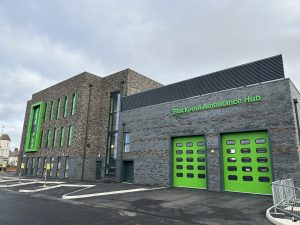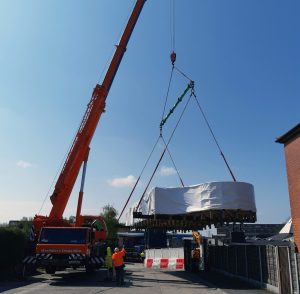In a post-pandemic world, now more than ever it is evident there is strength in community. We all have a role to play in investing back into the communities we live in and making them a safe, healthy, and sustainable place now and for the future. The topic of social value has been somewhat overshadowed by the focus on environmental impact and reducing our carbon footprint, which is not surprising, given the critical status of the climate crisis and the negative impacts of adverse weather occurring right across the globe.
Social value has a rightful position on the priority agenda as we continue to battle with deep-rooted problems. So, in this article, Key Account Manager Natalie Palframan, with support from Stepnell, Tilbury Douglas and AHR explores why social value matters and the long-term benefits.
What is Social Value?
According to the UK Green Building Council (UKGBC), “Social value encompasses environmental, economic and social wellbeing and understands each of these in terms of their impact on the quality of life of people. What outcomes improve quality of life, and how to deliver them, will look very different depending on the context. The most important contextual factor is who will be affected and what their needs are.” This can be a real challenge for organisations, as there is no clear framework of objectives and is largely determined by specifically localised factors. Without a clear set of measurables, it can pose a difficult task for construction companies to understand how to deliver and quantify social value. UKGBC defines social value for the built environment as, “when buildings, places and infrastructure support environmental, economic and social wellbeing, and in doing so improve the quality of life of people. Exactly which environmental, economic, and social outcomes create social value will depend on the best interests of the people most impacted by the project or built asset. Those outcomes must be defined for each built environment project.”
The Social Value Model
New measures launched by the Government has seen the Public Services (Social Value) Act 2012 superseded by the Social Value in Procurement Model. The extended criteria will ensure that social value within larger public procurement contracts is fully provided for and evaluated, rather than just considered. The new standards set out to encourage new jobs and skills, promote economic growth and success, and appropriately address climate change in a large-scale effort to level up the UK.
Government tenders will adopt the Social Value Model to assess and score suppliers on the positive benefits they can contribute and the added social value they can demonstrate when bidding for public sector contracts. The measures provide a fail-safe for construction projects to deliver on value for money, develop a culture of consideration for socio-economic welfare and build a more robust and diverse supplier base. Each public sector project will have a well thought through project plan to deliver social value in the built environment from conception through to project delivery.
Elaine Kendall, Social Value & Engagement Manager, commented: “The long-term societal, ethical and environmental benefits that can be provided through delivering social value during construction cannot be underestimated. The pandemic and its legacy have had an enormous impact on people’s livelihoods, health and wellbeing, and it will continue to have wide-ranging social and environmental implications as we rebuild our economy.
As a responsible contractor with over 150 years’ experience working in local communities, we understand that a project is not just ‘bricks and mortar’ and that it is an important opportunity to help enrich the lives of local people, while helping our clients ensure their investments provide genuine value to society. Working collaboratively with Procure Partnerships Framework, we take a localised approach and make social value central to the delivery of all projects, to help decrease demands for public finances and provide long-term sustainable outcomes for the communities where we live and work.”
Delivering long-term benefits through Social Value
The construction industry must engage with local communities to understand their specific requirements and challenges. Opening a dialogue and engaging with community stakeholders and representatives enables a holistic approach and will help break down barriers to bring the community onboard with construction projects. Understanding the social value benefits the project can deliver will bridge the gap between the construction company and the community.
Social value can deliver the following long-term benefits:
Employment – This can include upskilling employees by offering further training opportunities or taking on workers through an apprenticeship scheme. This has social and economic advantages to the local community, by getting people into employment, offering them experience and training to improve their long-term employment opportunities and reduce unemployment rates in the area. This reduces economic inactivity and promotes social mobility. There are also benefits to the construction sector, as apprentices can be deployed across multiple projects to improve contractor collaboration, and the apprenticeship schemes help to close the skills gap crisis the sector is facing.
Healthy Communities – Construction companies can support wellbeing, diversity and inclusion by supporting social value initiatives in the community. By investing in charities and non-profit organisations with a focus on mental health, combating anti-social behaviours, educating society to reduce hate crimes, organising food provisions to the vulnerable, and organising events that bring communities together, this promotes safer and healthier neighbourhoods. The result is economic improvement; with areas reducing deprivation, reducing crime, and improving health, putting less long-term strain on emergency services and the NHS.
Sustainable Futures – Social value is a key driver in community regeneration, environmentally friendly practices and delivering outcomes to improve our quality of life. With social value at the centre of each and every public sector project, we are shaping a more sustainable future for our communities.
Mark Stead, Director at AHR, Commented: ‘For private organisations working with public sector clients, it is now more crucial than ever to understand and commit to social value, as it becomes more and more prominent in procurement and project delivery.
There are challenges for everyone involved, but stakeholder engagement, innovative thinking and a true partnership will maximise success. A localised approach is also key, ensuring initiatives are tailored to local needs and benefits are delivered to the most vulnerable in regional communities.
We must work collaboratively with clients and wider stakeholders to identify opportunities for social value and work to maximise the benefits associated with public spending.’
Social Value Champions
Social Value is at the heart of everything that we do and we utilise our in house Compliance Chain portal to capture monitor and report on project specific Social Value across our framework projects.
This holistic view to Social Value ensures that we achieve demonstrable and measurable outcomes across all framework projects, and social value is not tokenistic. Across each framework project we will set targets and capture outcomes that will be fed back to our framework clients with monetary ‘Social Value Add’ values attributed to all activities.
Jess Taylor, Business Development Manager, Tilbury Douglas Construction: Social value is no longer a set of nebulous ideals and ‘nice-to-haves’, but a roadmap of clear themes, outcomes and measures to ensure benchmarked accountability across the board. We deal with the hard bottom line every day, however, there are many other imperatives that are vital. How happy our employees are; how our projects impact local communities; the social benefit our projects can bring.
Now more than ever, we need to be the creators of added value. Value that will ensure high impact and positive ripple effects through society, be it through spending with local supply chains, targeting better ecological solutions or providing further opportunities for young an unemployed people.”
Click Here To Download a Procure Partnerships Framework User Guide
Twitter
Linkedin



